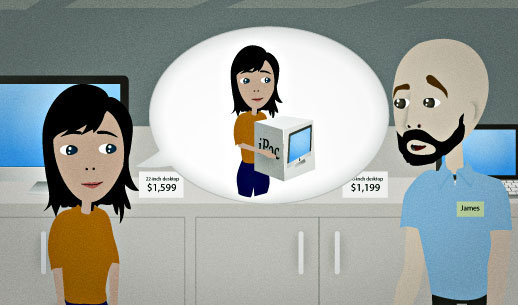“OK. Well, I'll take it.”
You're shopping for a new computer at an electronics store. After asking a salesperson a few questions, you say this because you're ready to buy the computer that he recommends.
OK. Well, I'll take it.
Want Video and Sound? Follow us on YouTube

Well
One reason for saying "well" at the beginning of a sentence is to show that you're unsure about something.
This can happen when someone asks you a question that you don't immediately know the answer to:
A: What are you doing this weekend?
B: Well, let's see... Oh! I'm having lunch with Gavin on Saturday.
It can also happen when you're trying to say something nice, even though you're thinking things that aren't nice.
A: What do you think of Lana?
B: Well... she's... always very punctual.
You shouldn't use "well" in this way in formal written English.
I'll take it.
This is the standard phrase that people use when they decide to buy something. You say this to the salesperson after you've discussed the item for a while. You usually use this phrase when shopping for expensive items like:
- a car
- a house
- tools
- art
Notice that this phrase uses "I'll ___" which is short for "I will ___." One of the main ways that English speakers use "will" is to announce a decision that they've just made.
A: Oh, I love that picture.
B: Yeah? I'll send it to you.
OK.
One of the ways that English speakers use "OK" is to signal a change in the flow of conversation.
For example, before you begin a meeting everyone might be making small talk and chatting about different topics. To start the serious business part of the meeting, you can start with "OK".
You can also use "OK" when you want to:
- start a new topic of conversation
-
announce a decision
-
ask other people to make a decision
-
end a conversation
